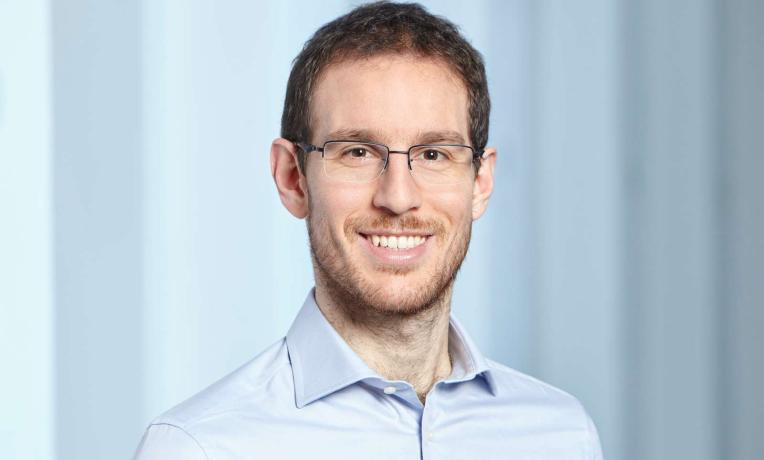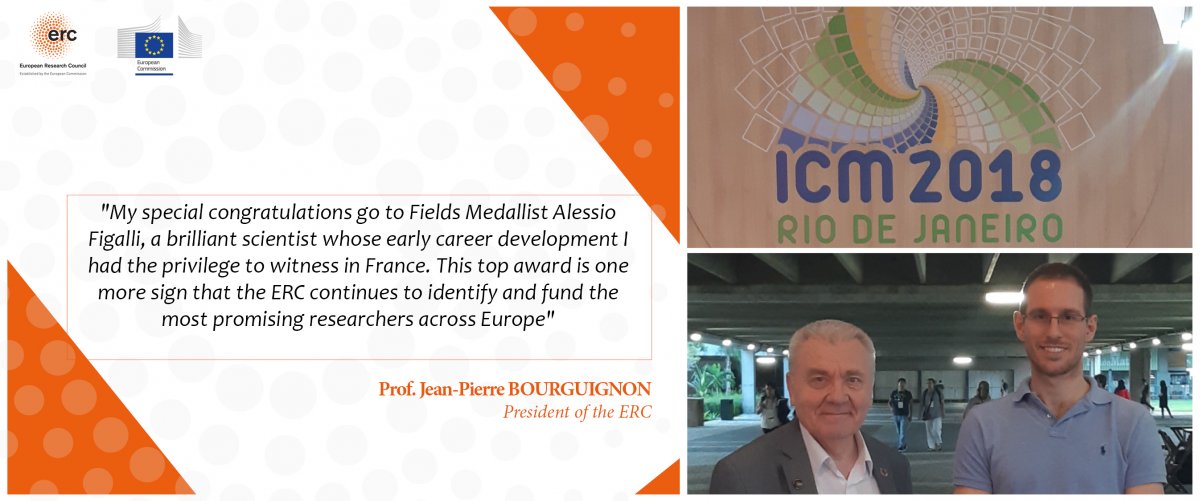Growing up I didn't even know that mathematicians existed!

You have just received the most prestigious award in the field of mathematics, how will this impact your future work?
This is not an easy question because I am not sure what will happen. Let's say that this is of course an enormous recognition for me, I'm extremely happy and I feel it's an award for both for my research and for my whole field, the field of Partial Differential Equations (PDEs), and the whole community working in my area. In particular the optimal transport field, the field of elliptic partial equations, calculus of variation, I've touched many areas of mathematics and this means that the mathematical community cares about these questions and their results and impact. It just gives me more motivation to keep working on my area, more energy to keep going and try and achieve more results.
What made you decide to become a mathematician?
Growing up I didn't even know that mathematicians existed! I thought that it was essentially done and there wasn't much left to work on. I discovered mathematics more as a dynamic and intellectual process of challenging and solving problems at the end of high school, at the Maths Olympiads. This was an illumination for me, understanding that mathematics can be creative and useful. And this pushed me to apply for the Scuola Normale Superiore in Pisa which was the beginning of everything. Once I got in, I started to understand what mathematics really was. I came from classics, my high school was not a scientific one, I was studying Latin, Greek, Philosophy, everything but Maths. This was a revelation for me. I loved it. My career just came naturally from that.
My teachers were fundamental. I first met Luigi Ambrosio when I was a second year undergraduate and he was very important for me. And then the person that made me move to France, that made me set a foot in the world of academia was Albert Fathi who was visiting Pisa in 2004 and was holding a class that I attended. We started to chat and he asked me to spend a semester at Ecole Normale in Lyon. There I met Cedric Villani, who Ambrosio thought would be a natural co-supervisor for my PhD. That was the beginning of my joint work between Italy and France. Then someone suggested I apply for a CNRS position which I got, and started my French path.
While I was at the Ecole Politechnique I was offered a position in Austin, Texas where Luis Caffarelli, a very famous mathematician, was based. I always admired him so much that I thought this was an unmissable opportunity to learn from him. I was 25 back then so it was the perfect moment for me to try the US experience. I spent seven years there, and it was great, I learnt so much there and I learnt so much from Caffarelli. However, I always thought I would want to move back to Europe, also for personal reasons. I ended up in Switzerland for the last two years.
When the opportunity came from ETH, I thought I should apply for the ERC which is a really valuable support.
All my career panned out so naturally. I never planned anything. Occasions came and I seized them. I had to make choices but I tried to choose the best path both as a person and a scientist. Also I've been lucky to meet great people, inspiring people who gave me a lot of important advice. I think mathematics is a very creative process but I am not a mathematician who likes to work on his own. I like to interact and work with others. Someone has a different way of thinking and you always learn something. I have a lot of collaborators and I like this aspects. Plus sometimes these end up being very deep friendships and that is an added bonus.
What are your hopes for the future?
I am lucky to say I've achieved a lot for a young person, which has given me a lot of personal satisfaction. The more you achieve good results the more you believe you can do more. Receiving this award in an encouragement to keep doing valuable work, and there are so many unsolved problems in my area. For every problem that you solve there are at least five that you cannot solve, especially with difficult problems. You are lucky with some of them but most of them are still there waiting for me. I think I have work for the next 30-40 years and I am not scared of this.
What is your work about?
There is one line of research which has characterised my work for the last ten years. This is how to apply optimal transport theory to other areas. The optimal transport problem is this theory of finding the cheapest optimal way of transporting resources from one place to another. At the origin it's a very practical question. And then it turns out it has so many applications to many many other areas of mathematics, and that's what has been one of my focuses.
One thing I've done for instance has been to apply optimal transport to study the shape of crystals. You get a crystal and you apply energy, for example through heating it up. You want to understand how the shape will change as a function of the energy you apply. During this heating process you can understand how particles move and by understanding the way they carry you can understand how optimal shapes form. Another thing I have done is trying to describe the evolution of clouds, let's say atmospheric fronts. One of the rules that we get from physics is that clouds tend to move in time to dissipate as little kinetic energy as possible. Because of that you can realise that the clouds move from one state to another in such a way that at an infinitesimal scale, particles move following optimal transport theory.
Watching this video you are accepting Youtube cookies policy
Prof. Figalli's life and work © IMU
All these connections have been part of my previous research. Optimal transport can be used in many other problems. People realise this but sometimes they don't realise how to extract the information you need from it. This is a very deep mathematical question that requires some knowledge of PDEs and there are a lot of questions related to these PDEs that still go unanswered. I have a lot of lines of investigation in mind.
Another thing that I've been doing is exploring free-boundary problems where you try and understand phase transitions. A very simple example is the problem of ice turning into water. You have ice and water and you try to understand how the interface between the two changes in time. There are so many open questions related to this that I am still working on.
How do you see things in the next five years for your research?
It's always difficult to predict. Sometimes discoveries come out very unexpectedly, sometimes you feel like problems are moving very well. Right now I'm extremely happy and excited about the applications of these free boundary problems and phase transition problems. I will talk about it in my plenary lectures here at ICM. We very recently made some discoveries that really opened directions allowing us to solve problems that have been unsolved for forty years.

Other than that you never know. I remember thinking about a question related to cloud movement, behind which lies a mathematical equation called Monge-Ampere equation. I started thinking about it in 2005 when I was still a student and I found a solution in 2012, and it was a really important achievement. Mathematics is like that, some things you feel are going well, for others you need to be patient. That, I think, is a very important thing and understood at European level. Five years, the length of an ERC grant, is a great time to be supported for.
I think applying for grants is a very interesting intellectual process because it gives one the time to write a project and decide which problems are worth investing time in. Then you need to convince the evaluator that those problems are indeed worthy. This is important. If you don't put some thought in your research maybe you get distracted with unimportant question. But another aspect of this is, once you've been convinced by a person's ideas, you have to give that person the freedom and the time to work on his questions. You cannot put a limit on it. That's why the ERC's is a very good formula. The support is extremely generous and I am extremely happy that Europe is investing in this.

